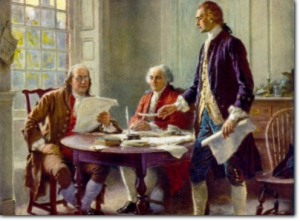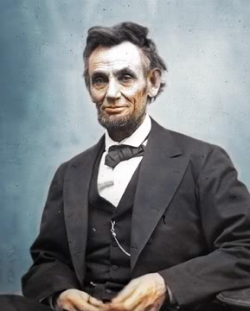 There are two distinguishing features to the existential crises in American history.
There are two distinguishing features to the existential crises in American history.
The first is it makes us return to first principles, causing us to re-examine, criticize, and eventually deify the past.
In the run-up to World War II, a crisis that really began four score and seven years ago, in 1932, there was a vogue for Abraham Lincoln. Henry Fonda and Raymond Massey did popular biopics, and his memorial became a sort of Ground Zero for what was best in our political natures.
In our time, Lin Manuel Miranda did this to Alexander Hamilton while Ron Chernow, who did the biography of Hamilton on which the movie was based, proceeded to resurrect U.S. Grant. The purpose of both these pieces of art was political. Miranda wanted to highlight the importance of immigrants in getting the job done. Chernow wanted to push back against a Confederate-inspired view of history that still, 150 years later, has those who supported human rights being disparaged while those they fought are exalted.
We love to call America the world’s oldest democracy. We revere the founders as giants. We even call them the Founders.
But the original Constitution was profoundly anti-democratic. Women couldn’t vote. Neither could blacks, nor native Americans. The franchise was reserved for white males, and not even all of them. You had to be a property owner.
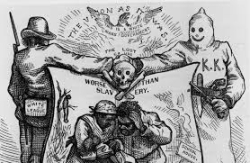
One-third of the amendments to our Constitution passed since the Bill of Rights, which was necessary to secure the underlying document, have involved voting rights. Yet the Jim Crow Project demonstrates that voting rights remain controversial, and that the democratic process remains iffy. Fading majorities will do anything to maintain power. This is at the heart of our present crisis.
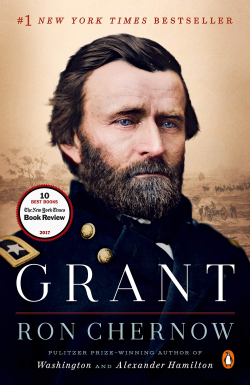
The other distinguishing feature of our crises is that the early violence is one-sided.
The Civil War didn’t really start with Fort Sumter. World War II didn’t really start with the invasion of Poland.
Southerners were killing abolitionists for 30 years before the Civil War. The fact that the only pre-war violence we tell kids about is John Brown’s Raid shows just how well various Klan Ridings, including our own, have succeeded in re-writing that history. The politics of Grant’s time remain confusing for just that reason. Grant wanted to annex the Dominican Republic and make it a state. It was the “liberal” Republicans who thought the KKK were “very fine people.”
The same was true in the run-up to World War II. Japan invaded Manchuria in 1934, then China itself three years later, and we paid no attention. Italy invaded Ethiopia in 1937 and Americans didn’t notice. Nazis took over Spain and the Republicans were being called “communists” two decades later, a reversal right out of the KKK playbook.
History isn’t always written by the winners. It’s usually written by those with the longest memories, and the greatest determination to teach their version to younger generations. That is our second lesson. What you learned in school was probably wrong.
I use these lessons in analyzing our present conflict.
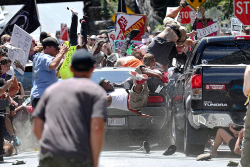
This is true both online and offline. I have reason to be thankful to my late mother for a first name that is easily seen as female. I’ve seen online sexual harassment with my own eyes. Harassment against my black neighbors is also increasing, as are real attacks against gays and others in the LGBTQ community. Hispanics are subject to it until they assimilate and then too many, like George Zimmerman, become racists themselves.
The purpose of racial harassment, as with terrorism, is anti-democratic. Trump is a staunch anti-democrat. Those who are following him down the current rathole oppose what America is supposed to stand for, in the name of the “greater good” of building themselves up by tearing others down.
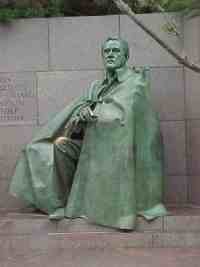
We like to think we’re the good guys, but we’re not, always. Usually when America goes to war in the developing world, we’re the bad guys. The fact that bad men are in charge, in this country, that today’s crisis is in our own hearts and minds, not just someone else’s, is the real existential crisis of our time.
As I noted earlier, Abraham Lincoln became deified during the last American crisis of this type, starting four score and seven years ago. We look at movies from the 1930s now and marvel that there could be any other side, but as the documentary A Night at the Garden reveals, there was. It was quite popular. They called it pro-American and it looks, 80 years later, disturbingly like a Trump rally.
The forces who stood against that rally were led by Franklin D. Roosevelt. His Four Freedoms — freedom to speak, freedom to worship, freedom from fear and (most important) freedom from want – remain highly controversial today.
It takes real political courage to stand for Roosevelt’s Four Freedoms in 2019, although they seem obvious. It took some political courage to stand by Lincoln’s legacy in 1939, when Marian Anderson sang in front of his monument, two months after the Nazi rally.
History doesn’t repeat but it does rhyme, and it does offer lessons. Most important, properly-taught history teaches values. Marian Anderson was right. The Nazis at the Garden were wrong. Franklin D. Roosevelt was right. Adolf Hitler was wrong.
Take that lesson to heart in making your political choices, because it’s going to be a bumpy political night. And there is a test every day. We are all Founders.


